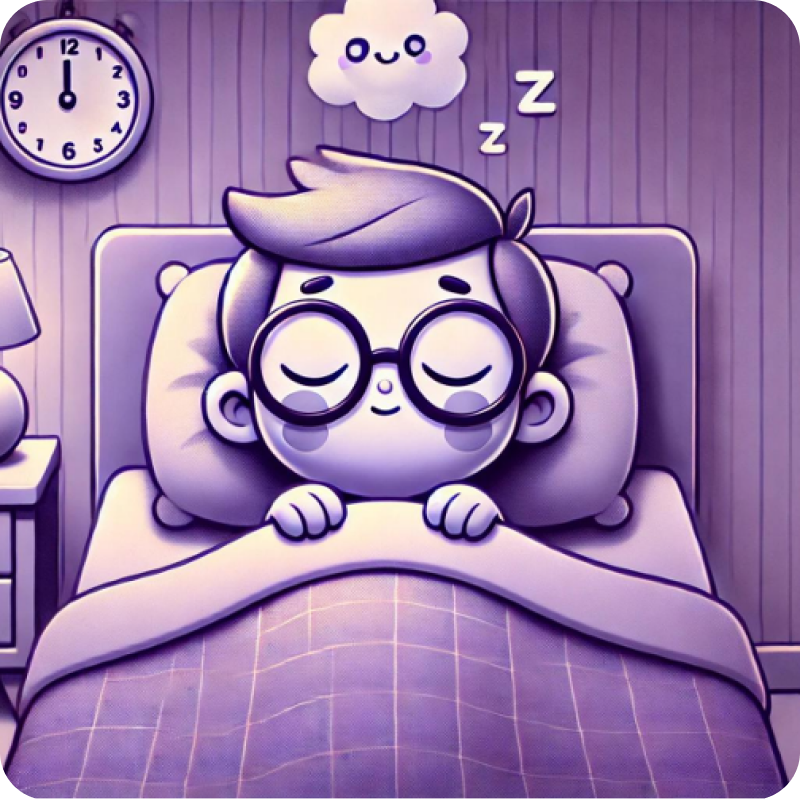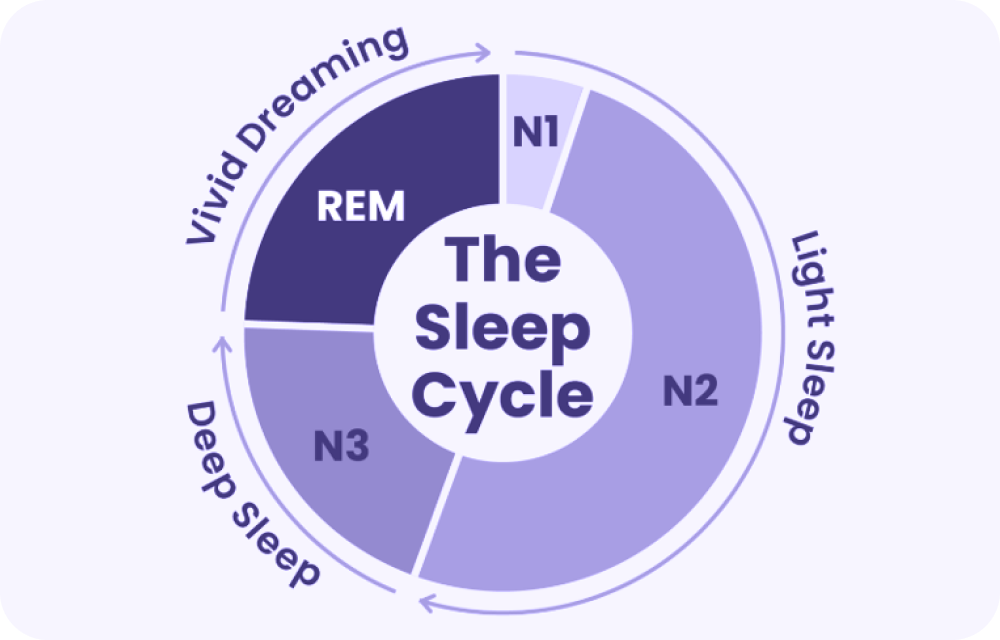RESEARCH
DIARY_

04
About the sleep cycle: sleep stages

Our sleep is programmed to repeat a
cycle. The cycle is divided into four stages, which represent the
depths of sleep.
The first sleep step is the shallowest sleep stage, N1. In this stage, our brain is not fully relaxed and physical and brain activities slow down. As someone can easily wake up during this sleep, they can go in and out of their dreams. If the sleep isn’t disturbed, after about 1-7minutes, they move to sleep stage 2.
Stage 2, referred to as N2, is when an individual moves into a more relaxed state. This stage usually lasts for about 10 to 25 minutes and involves dropping temperature, relaxing muscles, and slowing breathing and heart rate.
The first sleep step is the shallowest sleep stage, N1. In this stage, our brain is not fully relaxed and physical and brain activities slow down. As someone can easily wake up during this sleep, they can go in and out of their dreams. If the sleep isn’t disturbed, after about 1-7minutes, they move to sleep stage 2.
Stage 2, referred to as N2, is when an individual moves into a more relaxed state. This stage usually lasts for about 10 to 25 minutes and involves dropping temperature, relaxing muscles, and slowing breathing and heart rate.
Stage 3, referred to as N3, is when an individual is in a deep sleep
state. As muscle tone, pulse, and breathing rate decrease, the body
further relaxes, making it harder to wake up in this stage. This stage
replenishes energy in an individual, including body recovery and body
growth.
The last stage, REM sleep, is when the individual is in the deepest state and experiences the most vivid dreams. It is also the most essential sleep stage for the brain as it contributes the most to cognitive functions such as memory, creativity, and memory.
The last stage, REM sleep, is when the individual is in the deepest state and experiences the most vivid dreams. It is also the most essential sleep stage for the brain as it contributes the most to cognitive functions such as memory, creativity, and memory.

Factored with these 4 sleep stages, a sleep cycle is created that is
repeated throughout an individual’s sleep. The first sleep cycle lasts
about 70 to 100 minutes, and the latter lasts about 90 to 120 minutes.
While REM sleep, also gotten through the last stage, plays a
significant part in the brain, non-REM sleep, which relates to the
other 3 different stages of sleep, supports physical recovery and
immune function. A balanced mix of REM sleep and non-REM sleep is
crucial for an individual’s well-being.
In the early part of sleep, deep sleep stage lasts longer, sometimes up to an hour while the REM sleep only occurs for a few minutes. As the sleep processes, deep sleep stages last shorter and REM sleep lasts longer, with the final cycle of sleep commonly having up to an hour of REM sleep. In conclusion, most deep sleep occurs in the first half of the night, while lighter sleep cirrus in the second half of the sleep. This causes one to wake up more commonly in the later part of the night. Averagely, you wake briefly during the transition between sleep stages, commonly more than six times a night, but individuals usually fall back asleep within a second and don’t remember about it.
In the early part of sleep, deep sleep stage lasts longer, sometimes up to an hour while the REM sleep only occurs for a few minutes. As the sleep processes, deep sleep stages last shorter and REM sleep lasts longer, with the final cycle of sleep commonly having up to an hour of REM sleep. In conclusion, most deep sleep occurs in the first half of the night, while lighter sleep cirrus in the second half of the sleep. This causes one to wake up more commonly in the later part of the night. Averagely, you wake briefly during the transition between sleep stages, commonly more than six times a night, but individuals usually fall back asleep within a second and don’t remember about it.
Citations
* Sleep Foundation. "Stages of Sleep." Sleep Foundation,
www.sleepfoundation.org/stages-of-sleep.
* Sleep Foundation. "Stages of Sleep." Sleep Foundation,
www.sleepfoundation.org/stages-of-sleep.



